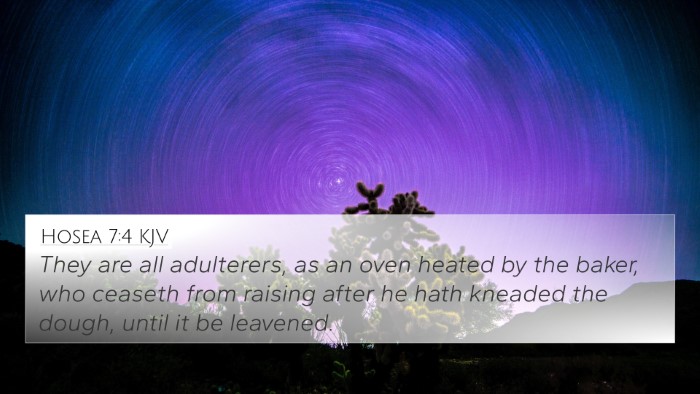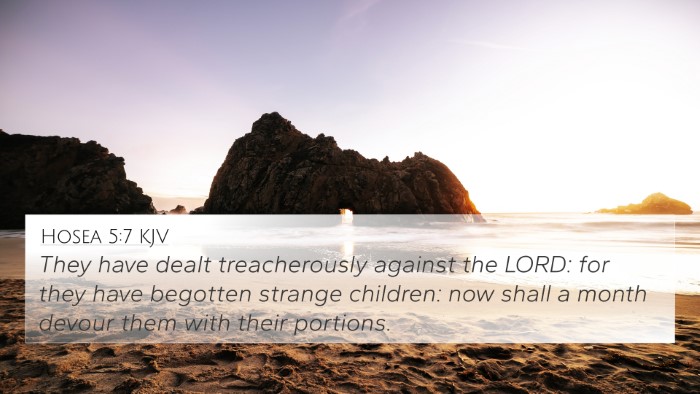Understanding Jeremiah 9:2
Jeremiah 9:2 states: "Oh, that I had in the wilderness a lodging place of wayfaring men; that I might leave my people, and go from them! For they be all adulterers, an assembly of treacherous men."
Meaning and Interpretation
This poignant verse expresses the deep anguish of the prophet Jeremiah over the spiritual state of his people. He yearns for a place of solitude away from the corruption that surrounds him.
Key Insights
- Longing for Solitude: Jeremiah's desire for a "lodging place" reflects his profound need to escape the pervasive sinfulness of his community, demonstrating the emotional toll that witnessing such unfaithfulness can take on a prophet.
- Corruption Among the People: The reference to "adulterers" indicates a betrayal not only of human relationships but also a spiritual infidelity against God. This symbolism is rich throughout Scripture, paralleling the themes of idolatry and unfaithfulness.
- Treacherous Assembly: The term "treacherous men" implies a deep-rooted dishonesty within society, suggesting that deceit and betrayal were rampant. Such wickedness fosters disunity and a departure from God's covenant.
Thematic Bible Verse Connections
In understanding Jeremiah 9:2, the following Bible verses offer significant connections:
- Hosea 4:1-2: Similar themes of unfaithfulness and moral decay are prevalent here as the prophet condemns Israel's sins.
- Ezekiel 18:30: This passage calls for repentance, echoing Jeremiah's sentiments of longing for righteousness.
- James 4:4: This New Testament verse identifies friendship with the world as enmity against God, paralleling Jeremiah's declarations about spiritual adultery.
- Isaiah 1:4: This verse also speaks to the rebellion and sinfulness of the people, akin to Jeremiah's anguish.
- Matthew 23:37: Jesus expresses a desire to gather His people, much like Jeremiah’s wish to flee from those who reject God.
- Revelation 3:14-19: The call to repentance parallels Jeremiah’s lament, as it addresses the complacency of God’s people.
- Matthew 15:8-9: Here, Jesus quotes Isaiah, emphasizing that the people honor God with their lips while their hearts are far from Him.
God's Perspective on Adultery and Betrayal
The themes of physical and spiritual adultery resonate deeply throughout Scripture. Jeremiah's context reflects a broader biblical narrative where God consistently addresses His people's unfaithfulness:
- Deuteronomy 31:16: God warns of the Israelites turning to worship foreign gods, demonstrating a breach of covenant.
- Jeremiah 3:20: Here, God laments His people being like a wife who is treacherous, indicating betrayal.
- Romans 1:21-25: The New Testament reiterates similar themes, where people exchange the truth of God for a lie, just as Israel did.
A Call for Reflection
This verse not only serves as a personal lament for Jeremiah but also as a profound call to reflect on our commitment to God amidst a world filled with moral ambiguity. It compels us to examine where we may have wandered from our faith and how we can return to a place of faithfulness.
Tools for Bible Cross-Referencing
To fully grasp the connections between these verses, employing tools for Bible cross-referencing can be immensely beneficial. Consider utilizing:
- Bible Concordance: A reference tool to locate verses based on keywords.
- Bible Cross-Reference Guide: Provides comparative studies of related scriptures.
- Cross-Reference Bible Study: Methods to systematically explore linked themes across the Bible.
Conclusion
Jeremiah 9:2 offers a rich tapestry of understanding about the emotional weight of prophetic ministry, the nature of sin within a community, and the longing for a more intimate connection with God. By cross-referencing the themes present in this verse with others throughout Scripture, we gain deeper insights into God’s character and the condition of His people, both then and now.

















